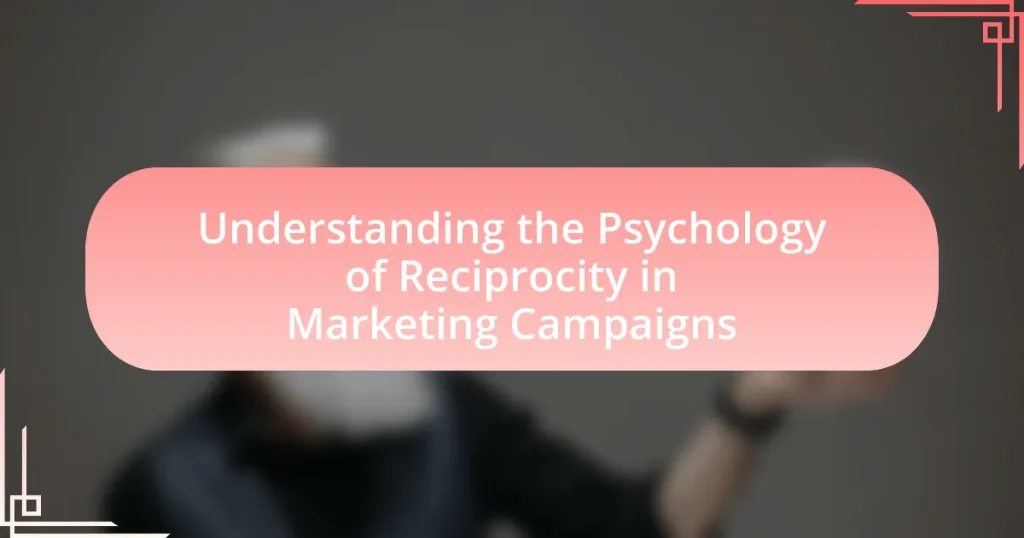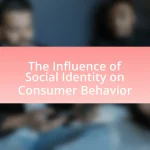The article focuses on the psychology of reciprocity in marketing campaigns, highlighting how this principle compels consumers to return favors or benefits received from brands. It explores the influence of reciprocity on consumer behavior, emphasizing the importance of offering value, creating emotional connections, and fostering trust to enhance customer loyalty and retention. Key elements of effective reciprocity strategies, such as free samples, discounts, and personalized communication, are discussed, along with the ethical considerations and potential pitfalls marketers should be aware of. The article also outlines practical tips for leveraging reciprocity ethically to build lasting customer relationships and drive sales.
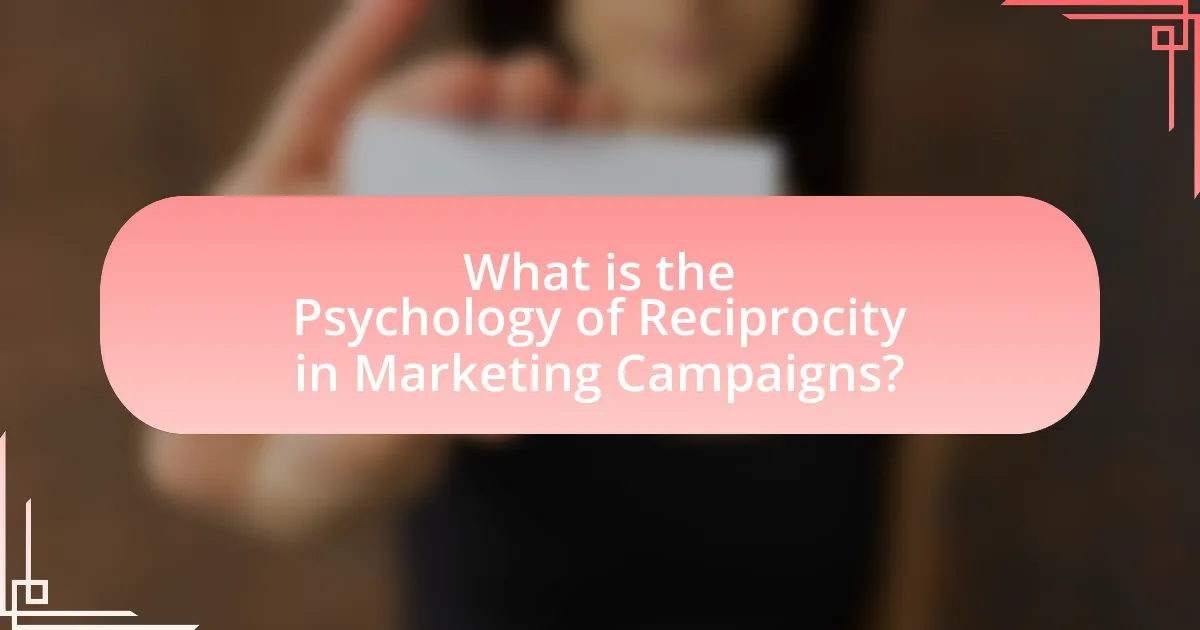
What is the Psychology of Reciprocity in Marketing Campaigns?
The psychology of reciprocity in marketing campaigns refers to the principle that individuals feel compelled to return favors or benefits received from others. This psychological phenomenon is leveraged in marketing strategies to encourage consumer engagement and loyalty. For instance, when brands offer free samples, discounts, or valuable content, they create a sense of obligation in consumers to reciprocate, often by making a purchase or promoting the brand. Research by Cialdini (2009) highlights that this principle is rooted in social norms and can significantly influence consumer behavior, demonstrating that reciprocity can enhance customer relationships and drive sales.
How does the concept of reciprocity influence consumer behavior?
The concept of reciprocity significantly influences consumer behavior by creating a sense of obligation among consumers to return favors or benefits received from brands. When consumers perceive that a brand has provided them with something of value, such as a free sample or a discount, they are more likely to feel compelled to make a purchase or engage with that brand in return. Research by Cialdini (2009) highlights that this principle is rooted in social norms, where individuals feel a moral duty to reciprocate kindness. Additionally, studies show that marketing strategies leveraging reciprocity can lead to increased customer loyalty and higher sales conversion rates, as consumers are motivated to reciprocate the perceived generosity of the brand.
What psychological principles underpin the idea of reciprocity?
The psychological principles underpinning the idea of reciprocity include the norm of reciprocity, social exchange theory, and the principle of obligation. The norm of reciprocity suggests that individuals feel compelled to return favors or kindnesses, which is a fundamental aspect of social interactions. Social exchange theory posits that relationships are formed based on the perceived benefits and costs, leading individuals to reciprocate to maintain balance. The principle of obligation indicates that when someone receives a benefit, they feel a moral duty to repay it, reinforcing social bonds and cooperation. These principles are supported by research, such as Cialdini’s work on influence, which demonstrates that people are more likely to comply with requests after receiving a gift or favor, highlighting the powerful role of reciprocity in human behavior.
How does reciprocity create a sense of obligation in consumers?
Reciprocity creates a sense of obligation in consumers by triggering a psychological response that compels them to return favors or benefits received. When consumers receive something for free, such as a sample or a discount, they often feel indebted to the giver, which can lead to increased likelihood of purchasing or supporting that brand. Research by Cialdini (2001) highlights that this principle of reciprocity is a powerful motivator in social interactions, suggesting that individuals are more inclined to reciprocate when they perceive an imbalance in giving and receiving. This sense of obligation can significantly influence consumer behavior, driving them to engage with brands that have provided them with initial value.
Why is reciprocity important in marketing strategies?
Reciprocity is important in marketing strategies because it fosters a sense of obligation among consumers, encouraging them to return favors or engage with brands that have provided value. This psychological principle, rooted in social norms, suggests that when a brand offers something of value—such as free samples, discounts, or helpful content—consumers feel compelled to reciprocate, often by making a purchase or promoting the brand. Research indicates that reciprocity can significantly enhance customer loyalty and increase conversion rates, as demonstrated by a study published in the Journal of Consumer Research, which found that consumers are more likely to respond positively to brands that initiate a giving behavior.
What advantages does reciprocity provide to marketers?
Reciprocity provides marketers with the advantage of fostering customer loyalty and increasing engagement. When marketers offer something of value, such as free samples or helpful information, customers feel compelled to reciprocate, often by making a purchase or engaging with the brand. Research indicates that this principle is rooted in social psychology, where the norm of reciprocity drives individuals to return favors, thereby enhancing the likelihood of repeat business. For instance, a study published in the Journal of Consumer Research found that consumers who received a small gift were significantly more likely to make a purchase compared to those who did not receive anything, demonstrating the effectiveness of reciprocity in influencing consumer behavior.
How can reciprocity enhance customer loyalty and retention?
Reciprocity enhances customer loyalty and retention by fostering a sense of obligation among customers to return favors or benefits received from a brand. When businesses provide value, such as discounts, personalized services, or exclusive offers, customers feel compelled to reciprocate by making purchases or remaining loyal to the brand. Research indicates that 70% of consumers are more likely to engage with a brand that offers them something of value upfront, reinforcing the idea that reciprocity can significantly influence purchasing behavior and long-term loyalty. This psychological principle is rooted in social norms, where individuals feel a moral duty to repay kindness, thus creating a cycle of loyalty and retention.
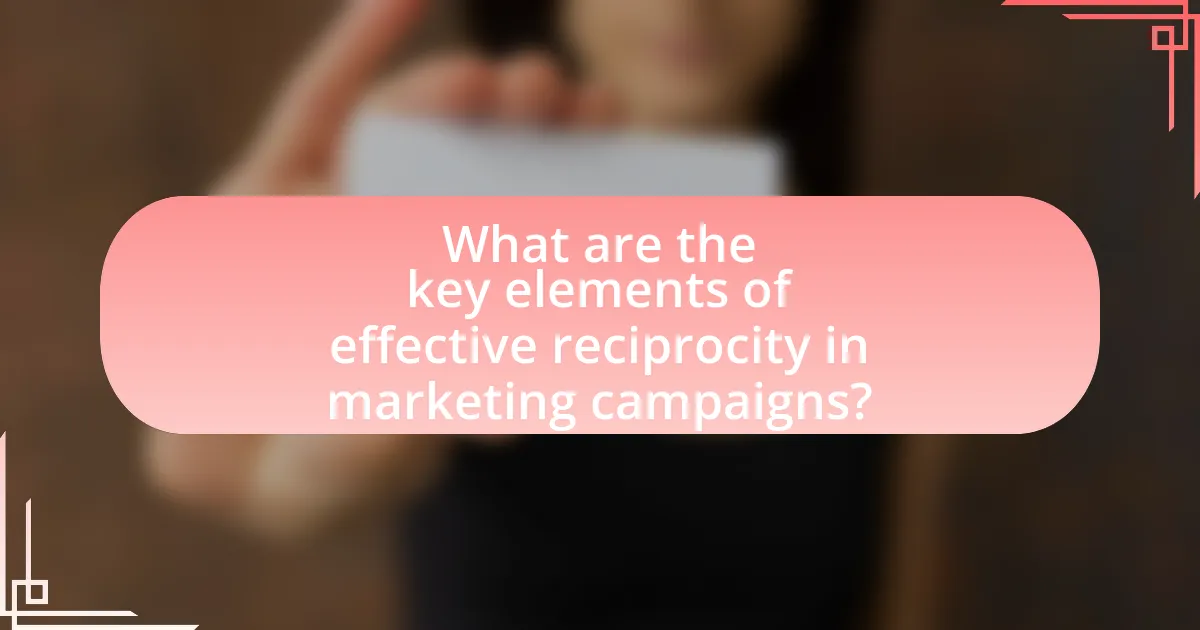
What are the key elements of effective reciprocity in marketing campaigns?
The key elements of effective reciprocity in marketing campaigns include offering value, creating emotional connections, and fostering trust. Offering value, such as free samples or useful content, encourages consumers to feel indebted and more likely to reciprocate with a purchase. Creating emotional connections through personalized communication enhances the likelihood of reciprocity, as consumers are more inclined to respond positively to brands that resonate with them. Fostering trust is crucial; when consumers believe a brand is reliable and transparent, they are more willing to engage and reciprocate. Research indicates that campaigns leveraging these elements can significantly increase customer engagement and loyalty, demonstrating the effectiveness of reciprocity in driving marketing success.
What types of reciprocal actions can marketers employ?
Marketers can employ various types of reciprocal actions, including offering free samples, providing valuable content, and implementing loyalty programs. Free samples create a sense of obligation in consumers, encouraging them to reciprocate by making a purchase. Valuable content, such as informative blogs or webinars, builds trust and fosters a relationship, prompting consumers to engage further with the brand. Loyalty programs incentivize repeat purchases by rewarding customers, reinforcing the cycle of reciprocity. These actions are effective because they leverage the psychological principle of reciprocity, which suggests that people feel compelled to return favors or kindnesses.
How do free samples and gifts function as tools of reciprocity?
Free samples and gifts function as tools of reciprocity by creating a sense of obligation in recipients to return the favor, which can lead to increased customer loyalty and purchases. When consumers receive a free sample or gift, they often feel indebted to the giver, prompting them to reciprocate through future purchases or positive word-of-mouth. This psychological principle is supported by research, such as the study by Cialdini et al. (1975), which demonstrates that individuals are more likely to comply with requests after receiving a gift, highlighting the effectiveness of reciprocity in influencing consumer behavior.
What role do discounts and exclusive offers play in fostering reciprocity?
Discounts and exclusive offers significantly enhance the sense of reciprocity among consumers. When businesses provide these incentives, they create a feeling of obligation in customers to reciprocate the favor, often by making a purchase or engaging with the brand. Research indicates that consumers perceive discounts as a form of gift, which triggers the norm of reciprocity, compelling them to respond positively. For instance, a study published in the Journal of Consumer Research found that when customers receive a discount, they are more likely to feel indebted to the brand, leading to increased loyalty and repeat purchases. This psychological mechanism illustrates how discounts and exclusive offers effectively cultivate a reciprocal relationship between consumers and brands.
How can marketers measure the effectiveness of reciprocity strategies?
Marketers can measure the effectiveness of reciprocity strategies by analyzing customer engagement metrics, conversion rates, and customer feedback. These metrics provide insights into how well reciprocity strategies, such as offering free samples or exclusive content, influence customer behavior. For instance, a study published in the Journal of Marketing Research found that customers who received a gift were 20% more likely to make a purchase compared to those who did not receive anything. Additionally, tracking changes in customer lifetime value and repeat purchase rates can further validate the impact of reciprocity strategies on long-term customer relationships.
What metrics should be used to evaluate the impact of reciprocity on sales?
To evaluate the impact of reciprocity on sales, key metrics include customer retention rate, average order value, and conversion rate. Customer retention rate measures the percentage of repeat customers, indicating how well reciprocity fosters loyalty. Average order value reflects the increase in spending per transaction, which can be influenced by reciprocal gestures. Conversion rate tracks the percentage of visitors who make a purchase, showing how effective reciprocal marketing strategies are in driving sales. These metrics provide concrete evidence of reciprocity’s effectiveness in enhancing sales performance.
How can customer feedback inform the success of reciprocity initiatives?
Customer feedback can significantly inform the success of reciprocity initiatives by providing insights into customer preferences and perceptions. When businesses collect and analyze feedback, they can identify which reciprocal actions resonate most with their audience, such as discounts, loyalty rewards, or personalized offers. For instance, a study by the Harvard Business Review found that companies that actively seek and implement customer feedback can increase customer satisfaction by up to 20%, leading to higher engagement in reciprocity programs. This data demonstrates that understanding customer sentiment directly influences the effectiveness of reciprocity initiatives, allowing businesses to tailor their strategies for maximum impact.
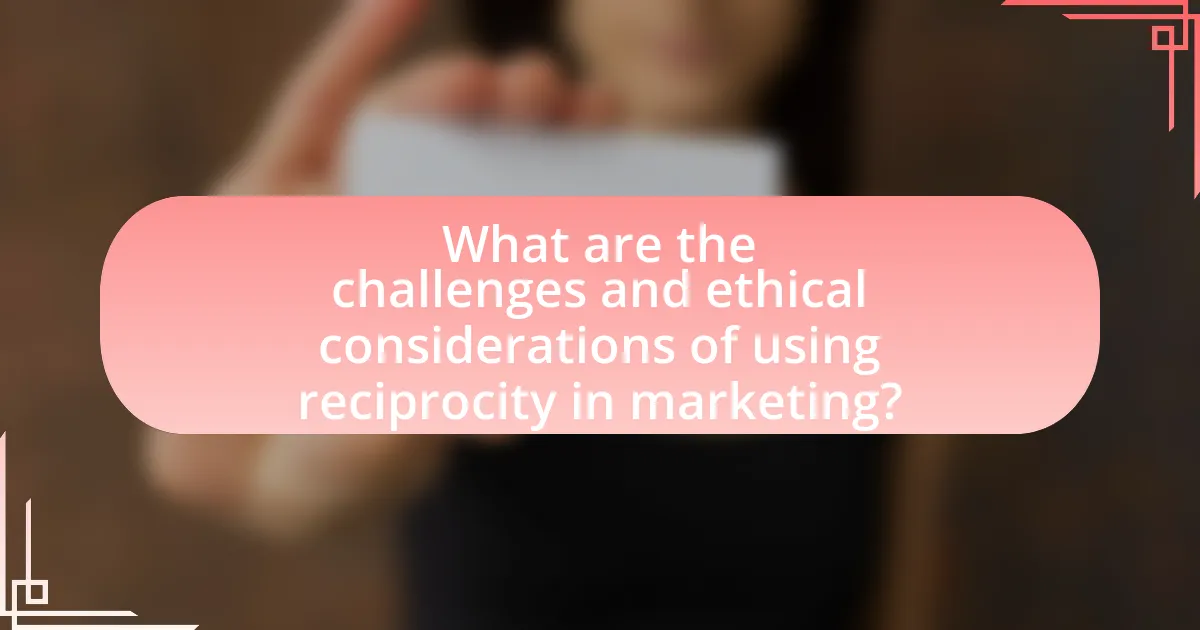
What are the challenges and ethical considerations of using reciprocity in marketing?
The challenges and ethical considerations of using reciprocity in marketing include potential manipulation of consumer behavior and the risk of eroding trust. Marketers may exploit the principle of reciprocity to create a sense of obligation, leading consumers to make purchases they might not otherwise consider. This can result in feelings of guilt or coercion among consumers, which can damage brand reputation. Additionally, ethical concerns arise when consumers are not fully aware of the marketing tactics being employed, as transparency is crucial for maintaining trust. Research indicates that consumers value authenticity and honesty, and deceptive practices can lead to backlash, as seen in studies highlighting the negative impact of perceived manipulation on customer loyalty.
What potential pitfalls should marketers be aware of when implementing reciprocity?
Marketers should be aware that one potential pitfall when implementing reciprocity is the risk of consumer backlash if the perceived exchange is unbalanced. When consumers feel that the favor or gift they receive is not matched by an equivalent return, they may develop negative feelings towards the brand, leading to decreased loyalty and trust. Research indicates that perceived inequity can result in resentment, as demonstrated in studies where participants reported dissatisfaction when they felt obligated to reciprocate but were unable to do so, highlighting the importance of maintaining a fair exchange in marketing strategies.
How can overuse of reciprocity lead to consumer skepticism?
Overuse of reciprocity can lead to consumer skepticism by creating a perception of insincerity in marketing efforts. When consumers encounter repeated offers or favors that seem excessive, they may begin to question the motives behind these gestures, suspecting that the brand is manipulating them for profit rather than genuinely caring about their needs. Research indicates that when consumers feel overwhelmed by constant reciprocity tactics, they may interpret these actions as a strategy to exploit their goodwill, leading to distrust. For instance, a study published in the Journal of Consumer Research found that excessive promotional offers can diminish perceived brand authenticity, resulting in increased skepticism towards the brand’s intentions.
What ethical dilemmas arise from manipulating reciprocity in marketing?
Manipulating reciprocity in marketing raises significant ethical dilemmas, primarily concerning consumer autonomy and deception. When marketers exploit the principle of reciprocity, they may induce consumers to feel obligated to return favors, which can lead to coercive purchasing behaviors. This manipulation undermines informed decision-making, as consumers may not fully understand the marketing tactics at play. Research indicates that such tactics can create a false sense of indebtedness, leading to purchases that consumers would not have made otherwise. For instance, a study published in the Journal of Consumer Research found that consumers who received free samples felt a stronger obligation to purchase, highlighting the ethical concern of exploiting psychological triggers for profit.
How can marketers ethically leverage reciprocity for long-term success?
Marketers can ethically leverage reciprocity for long-term success by providing genuine value to their customers, which fosters trust and encourages a reciprocal response. When marketers offer free resources, personalized experiences, or exclusive content, they create a sense of obligation among customers to reciprocate, often through loyalty or purchases. Research indicates that consumers are more likely to engage with brands that demonstrate care and consideration, as highlighted in a study by Cialdini (2009), which emphasizes the power of reciprocity in social interactions. By consistently delivering value and maintaining transparency, marketers can build lasting relationships that enhance customer retention and brand loyalty.
What best practices should be followed to ensure ethical reciprocity in campaigns?
To ensure ethical reciprocity in campaigns, organizations should prioritize transparency, fairness, and mutual benefit. Transparency involves clearly communicating the intentions and benefits of the campaign to all stakeholders, which fosters trust and encourages participation. Fairness requires that the benefits offered are proportional to the contributions made by participants, ensuring that no party feels exploited. Mutual benefit emphasizes creating value for both the organization and the participants, which can enhance long-term relationships and loyalty. Research indicates that campaigns adhering to these principles not only improve participant satisfaction but also lead to higher engagement rates, as seen in studies on consumer behavior and ethical marketing practices.
How can transparency enhance the effectiveness of reciprocity strategies?
Transparency enhances the effectiveness of reciprocity strategies by fostering trust and credibility between parties. When organizations openly share information about their intentions, processes, and outcomes, they create an environment where individuals feel more secure in reciprocating positive actions. Research indicates that transparency can lead to increased customer loyalty and engagement, as consumers are more likely to respond favorably to brands that demonstrate honesty and openness. For instance, a study published in the Journal of Marketing Research found that transparent communication significantly boosts consumer trust, which in turn amplifies the likelihood of reciprocal purchasing behavior. Thus, transparency not only strengthens the relationship between marketers and consumers but also amplifies the impact of reciprocity strategies in marketing campaigns.
What practical tips can marketers apply to utilize reciprocity effectively?
Marketers can effectively utilize reciprocity by offering valuable content or services upfront, which encourages customers to reciprocate with their loyalty or purchases. For instance, providing free trials, samples, or informative resources can create a sense of obligation in the consumer, leading to increased engagement and sales. Research shows that when customers perceive a brand as generous, they are more likely to respond positively; a study published in the Journal of Consumer Research found that consumers who received a small gift were significantly more likely to make a purchase compared to those who did not receive anything. By strategically implementing these tactics, marketers can foster a reciprocal relationship that benefits both parties.
